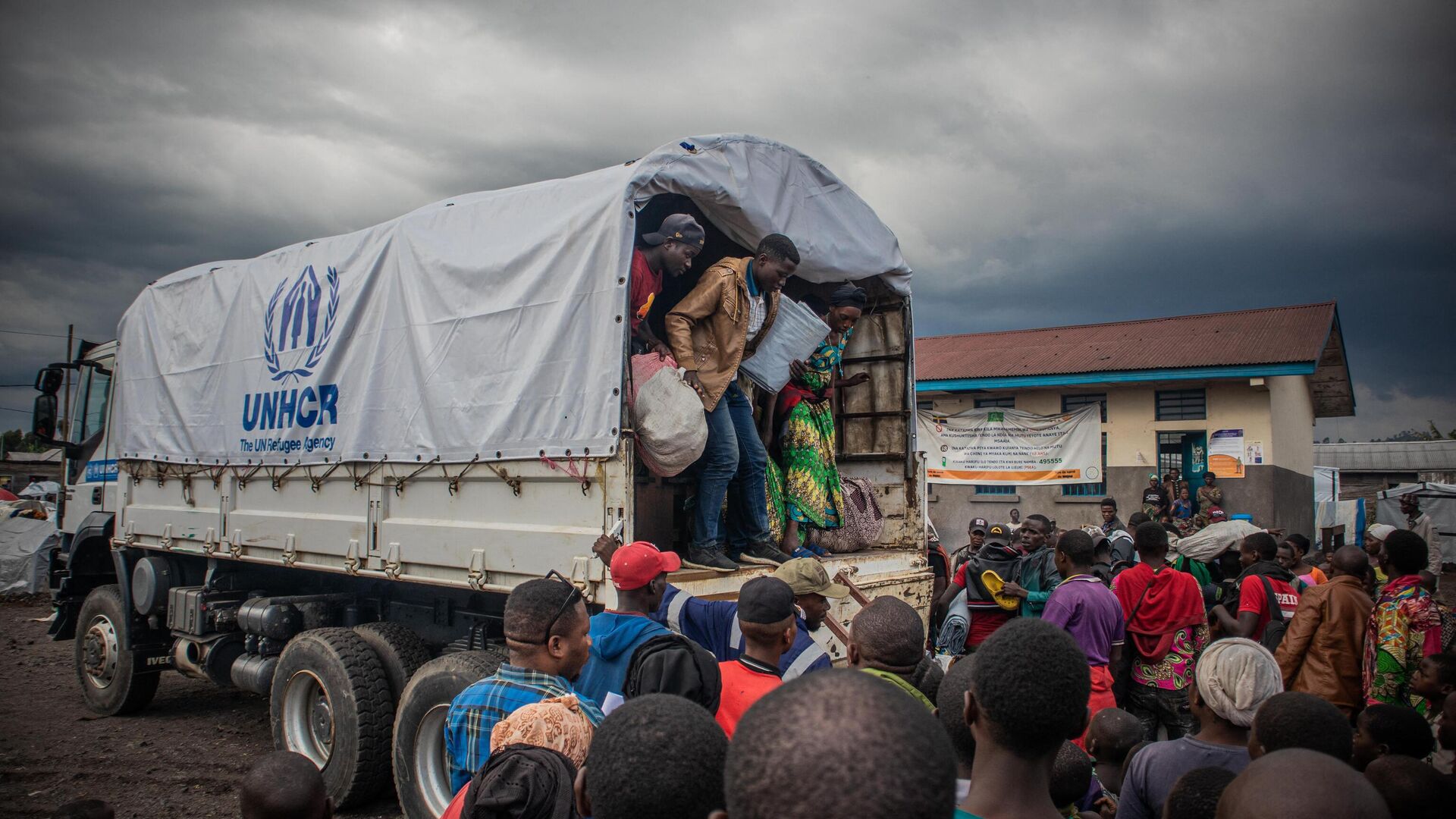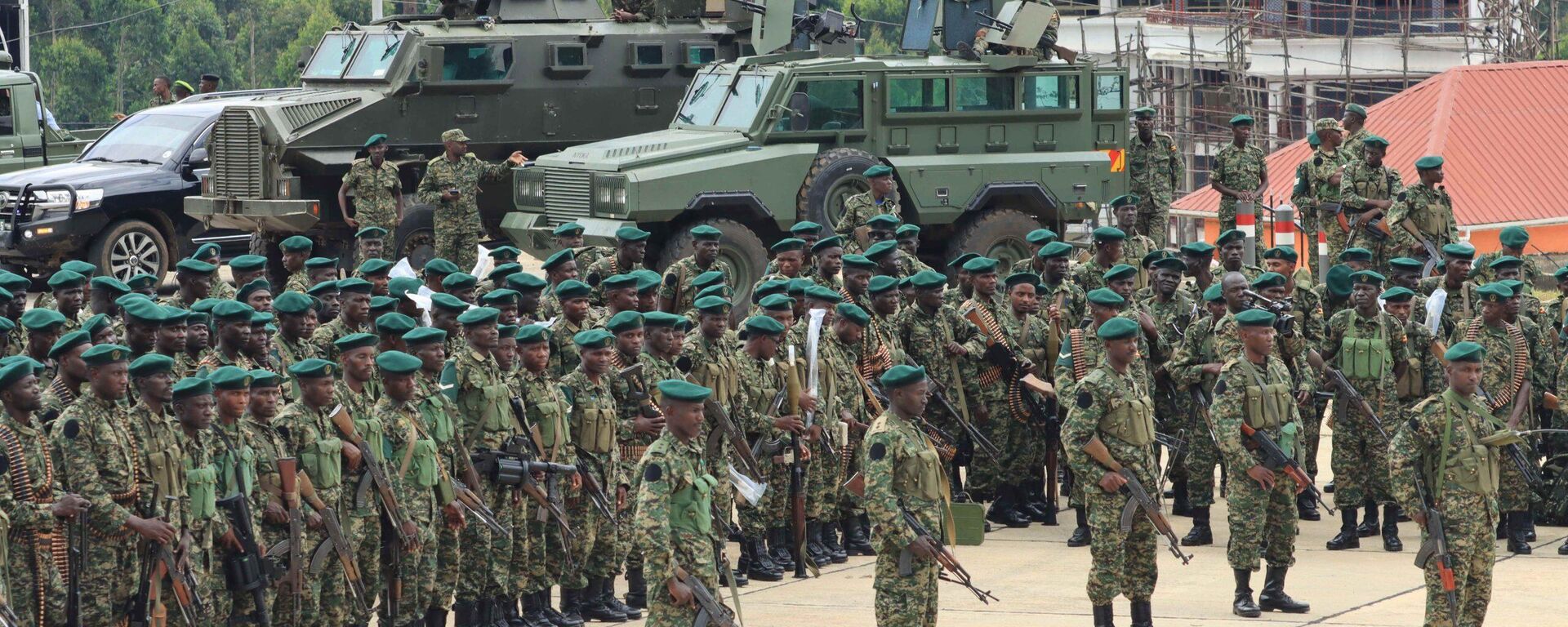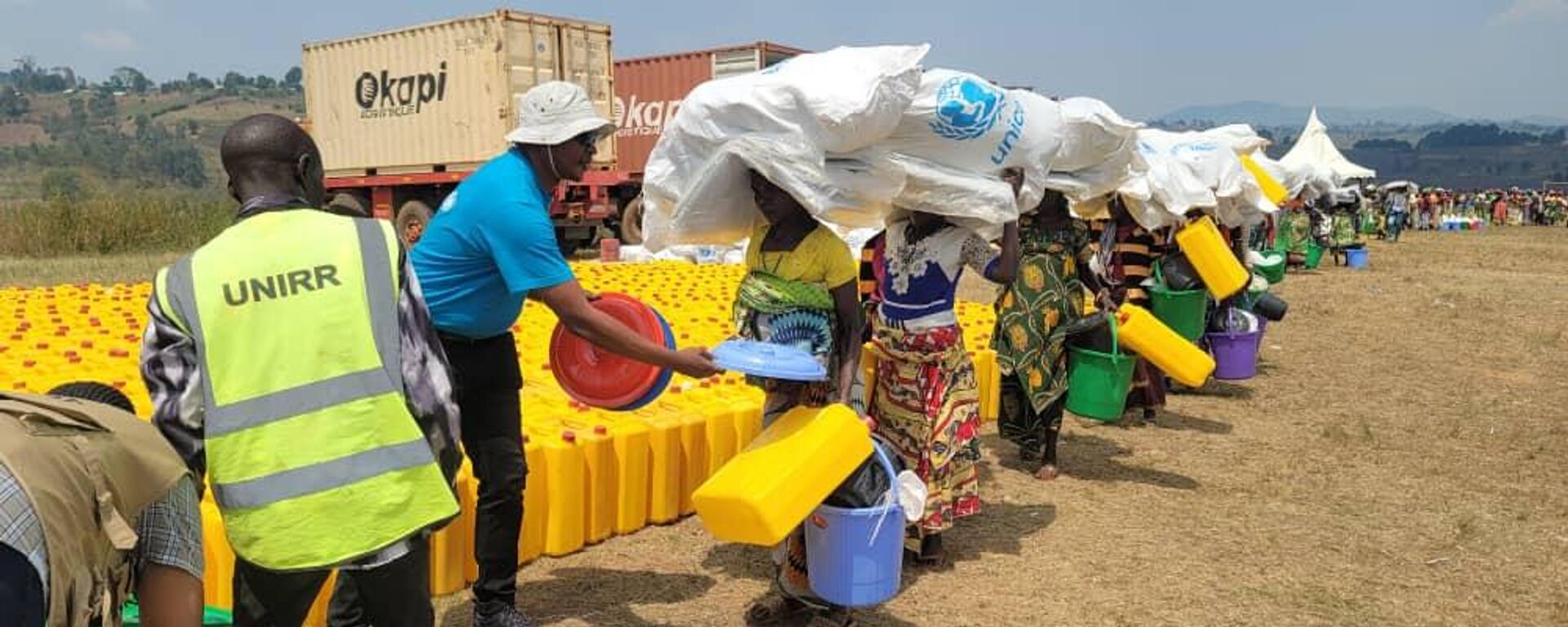https://en.sputniknews.africa/20231030/conflict--insecurity-in-dr-congo-force-nearly-7-mln-to-flee-their-homes-un-says-1063195370.html
Conflict & Insecurity in DR Congo Force Nearly 7 Mln to Flee Their Homes, UN Says
Conflict & Insecurity in DR Congo Force Nearly 7 Mln to Flee Their Homes, UN Says
Sputnik Africa
In the eastern provinces of the country, armed conflict and insecurity have been the primary causes of the extensive, long-term displacement experienced by the... 30.10.2023, Sputnik Africa
2023-10-30T14:54+0100
2023-10-30T14:54+0100
2023-10-30T14:54+0100
sub-saharan africa
central africa
democratic republic of the congo (drc)
migration
international organization for migration (iom)
humanitarian aid
united nations (un)
conflict
security
https://cdn1.img.sputniknews.africa/img/07e7/0a/1e/1063196571_0:160:3072:1888_1920x0_80_0_0_d47982c97896185fc0bac2ec2128dd9d.jpg
The number of internally displaced people has climbed to a record 6.9 million across the Democratic Republic of the Congo (DRC) due to the ongoing conflict and escalating violence, according to recent estimates by the United Nations (UN).The UN's International Organization for Migration (IOM) for the first time has collected nationwide displacement data from all 26 of the country's provinces through the Displacement Tracking Matrix, a system for collecting and analyzing primary data concerning population movement. Over 120 armed groups are reported to be operating in large parts of eastern DRC, destabilizing the country and neighboring areas. Last year, the security situation worsened when the M23 ("March 23 Movement") rebel group resumed its fight against the government.In North Kivu, the conflict with M23 has resulted in the displacement of approximately 1 million people, IOM said. Nearly 4.8 million, accounting for over two-thirds of the internally-displaced population, reside with host families.The organization highlighted that amid ongoing conflict and escalating violence, the DRC is confronting one of the world's largest humanitarian and internal displacement crises. As the security situation in particular in North Kivu and Ituri continues to worsen, movements occur more frequently, leading to a surge in humanitarian needs. In addition to the ongoing large-scale humanitarian crisis in the eastern region of the country, other regions have also experienced conflict, insecurity, and natural disasters such as floods and landslides.IOM said it is intensifying its efforts to address "the complex and persistent crisis" in the country, despite limited humanitarian access and rising security concerns. The organization has been involved in managing 78 displacement sites hosting over 280,000 internally displaced people. Since June, 3,347 emergency shelters have been built, 7,715 non-food item kits have been distributed, and 17,116 individuals have received water, sanitation, and hygiene assistance.The organization elaborated that it aims to support an additional 10,000 households in the next three months, stressing that there are still many more people in critical need of assistance to fulfill their basic needs.In August, the UNICEF warned of the deteriorating humanitarian situation in eastern DRC, highlighting that a surge in conflict and displacement in the region is pushing children into the worst cholera crisis since 2017, with at least 31,342 cholera cases recorded in the first seven months of 2023.
https://en.sputniknews.africa/20230906/east-african-community-extends-military-presence-in-drc-until-december-1061915507.html
https://en.sputniknews.africa/20230820/insecurity-pushes-children-in-dr-congo-into-worst-cholera-crisis-in-six-years-unicef-1061465634.html
central africa
democratic republic of the congo (drc)
Sputnik Africa
feedback@sputniknews.com
+74956456601
MIA „Rossiya Segodnya“
2023
News
en_EN
Sputnik Africa
feedback@sputniknews.com
+74956456601
MIA „Rossiya Segodnya“
Sputnik Africa
feedback@sputniknews.com
+74956456601
MIA „Rossiya Segodnya“
central africa, democratic republic of the congo (drc), migration, international organization for migration (iom), humanitarian aid , united nations (un), conflict, security
central africa, democratic republic of the congo (drc), migration, international organization for migration (iom), humanitarian aid , united nations (un), conflict, security
Conflict & Insecurity in DR Congo Force Nearly 7 Mln to Flee Their Homes, UN Says
In the eastern provinces of the country, armed conflict and insecurity have been the primary causes of the extensive, long-term displacement experienced by the region. Since mid-2022, this has been further aggravated by an upswing in armed group activity, resulting in internal turmoil, instability, and large-scale displacement.
The number of internally displaced people has climbed to a record 6.9 million across the Democratic Republic of the Congo (DRC) due to the ongoing conflict and escalating violence, according to recent estimates by the United Nations (UN).
The UN's International Organization for Migration (IOM) for the first time has collected nationwide displacement data from all 26 of the country's provinces through the Displacement Tracking Matrix, a system for collecting and analyzing primary data concerning population movement.
"As of October 2023, most internally displaced persons, about 5.6 million (81% of the total IDPs) live in the eastern provinces of North Kivu, South Kivu, Ituri, and Tanganyika. Conflict has been reported as the primary reason for displacement," the organization said.
Over 120
armed groups are reported to be operating in large parts of eastern DRC, destabilizing the country and neighboring areas. Last year, the security situation worsened when the M23 ("March 23 Movement") rebel group resumed its fight against the government.
In North Kivu, the conflict with M23 has resulted in the displacement of approximately 1 million people, IOM said. Nearly 4.8 million, accounting for over two-thirds of the internally-displaced population, reside with host families.
The organization highlighted that amid
ongoing conflict and escalating violence, the DRC is confronting one of the world's largest humanitarian and internal displacement crises. As the security situation in particular in North Kivu and Ituri continues to worsen, movements occur more frequently, leading to a surge in humanitarian needs.
"For decades, the Congolese people have been living through a storm of crises," said Fabien Sambussy, IOM’s Chief of Mission in DRC, adding: "The most recent escalation of the conflict has uprooted more people in less time like rarely seen before. We urgently need to deliver help to those most in need."
In addition to the ongoing large-scale humanitarian crisis in the eastern region of the country, other regions have also experienced conflict, insecurity, and natural disasters such as floods and landslides.
IOM said it is intensifying its efforts to address "the complex and
persistent crisis" in the country, despite limited humanitarian access and rising security concerns. The organization has been involved in managing 78 displacement sites hosting over 280,000 internally displaced people. Since June, 3,347 emergency shelters have been built, 7,715 non-food item kits have been distributed, and 17,116 individuals have received water, sanitation, and hygiene assistance.
The organization elaborated that it aims to support an additional 10,000 households in the next three months, stressing that there are still many more people in critical need of assistance to fulfill their basic needs.
In August, the UNICEF warned of the deteriorating humanitarian situation in eastern DRC, highlighting that a surge in conflict and displacement in the region is pushing children into the worst cholera crisis since 2017, with at least 31,342
cholera cases recorded in the first seven months of 2023.



